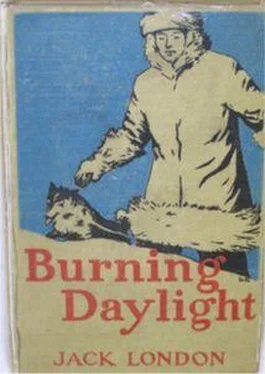Jack London - Burning Daylight
Здесь есть возможность читать онлайн «Jack London - Burning Daylight» весь текст электронной книги совершенно бесплатно (целиком полную версию без сокращений). В некоторых случаях можно слушать аудио, скачать через торрент в формате fb2 и присутствует краткое содержание. Год выпуска: 1910, Жанр: Классическая проза, Природа и животные, Путешествия и география, на английском языке. Описание произведения, (предисловие) а так же отзывы посетителей доступны на портале библиотеки ЛибКат.
- Название:Burning Daylight
- Автор:
- Жанр:
- Год:1910
- ISBN:нет данных
- Рейтинг книги:5 / 5. Голосов: 1
-
Избранное:Добавить в избранное
- Отзывы:
-
Ваша оценка:
- 100
- 1
- 2
- 3
- 4
- 5
Burning Daylight: краткое содержание, описание и аннотация
Предлагаем к чтению аннотацию, описание, краткое содержание или предисловие (зависит от того, что написал сам автор книги «Burning Daylight»). Если вы не нашли необходимую информацию о книге — напишите в комментариях, мы постараемся отыскать её.
Burning Daylight — читать онлайн бесплатно полную книгу (весь текст) целиком
Ниже представлен текст книги, разбитый по страницам. Система сохранения места последней прочитанной страницы, позволяет с удобством читать онлайн бесплатно книгу «Burning Daylight», без необходимости каждый раз заново искать на чём Вы остановились. Поставьте закладку, и сможете в любой момент перейти на страницу, на которой закончили чтение.
Интервал:
Закладка:
"It's sure prettier than office furniture," Daylight remarked.
"It sure is," she answered.
And Daylight, who knew his weakness in the use of the particular word sure, knew that she had repeated it deliberately and with love.
They crossed the stream and took the cattle track over the low rocky hill and through the scrub forest of manzanita, till they emerged on the next tiny valley with its meadow-bordered streamlet.
"If we don't run into some quail pretty soon, I'll be surprised some," Daylight said.
And as the words left his lips there was a wild series of explosive thrumming as the old quail arose from all about Wolf, while the young ones scuttled for safety and disappeared miraculously before the spectators' very eyes.
He showed her the hawk's nest he had found in the lightning-shattered top of the redwood, and she discovered a wood-rat's nest which he had not seen before. Next they took the old wood-road and came out on the dozen acres of clearing where the wine grapes grew in the wine-colored volcanic soil. Then they followed the cow-path through more woods and thickets and scattered glades, and dropped down the hillside to where the farm-house, poised on the lip of the big canon, came into view only when they were right upon it.
Dede stood on the wide porch that ran the length of the house while Daylight tied the horses. To Dede it was very quiet. It was the dry, warm, breathless calm of California midday. All the world seemed dozing. From somewhere pigeons were cooing lazily. With a deep sigh of satisfaction, Wolf, who had drunk his fill at all the streams along the way, dropped down in the cool shadow of the porch. She heard the footsteps of Daylight returning, and caught her breath with a quick intake. He took her hand in his, and, as he turned the door-knob, felt her hesitate. Then he put his arm around her; the door swung open, and together they passed in.
CHAPTER XXV
Many persons, themselves city-bred and city-reared, have fled to the soil and succeeded in winning great happiness. In such cases they have succeeded only by going through a process of savage disillusionment. But with Dede and Daylight it was different. They had both been born on the soil, and they knew its naked simplicities and rawer ways. They were like two persons, after far wandering, who had merely come home again. There was less of the unexpected in their dealings with nature, while theirs was all the delight of reminiscence. What might appear sordid and squalid to the fastidiously reared, was to them eminently wholesome and natural. The commerce of nature was to them no unknown and untried trade. They made fewer mistakes. They already knew, and it was a joy to remember what they had forgotten.
And another thing they learned was that it was easier for one who has gorged at the flesh-pots to content himself with the meagerness of a crust, than for one who has known only the crust.
Not that their life was meagre. It was that they found keener delights and deeper satisfactions in little things. Daylight, who had played the game in its biggest and most fantastic aspects, found that here, on the slopes of Sonoma Mountain, it was still the same old game. Man had still work to perform, forces to combat, obstacles to overcome. When he experimented in a small way at raising a few pigeons for market, he found no less zest in calculating in squabs than formerly when he had calculated in millions. Achievement was no less achievement, while the process of it seemed more rational and received the sanction of his reason.
The domestic cat that had gone wild and that preyed on his pigeons, he found, by the comparative standard, to be of no less paramount menace than a Charles Klinkner in the field of finance, trying to raid him for several millions. The hawks and weasels and 'coons were so many Dowsetts, Lettons, and Guggenhammers that struck at him secretly. The sea of wild vegetation that tossed its surf against the boundaries of all his clearings and that sometimes crept in and flooded in a single week was no mean enemy to contend with and subdue. His fat-soiled vegetable-garden in the nook of hills that failed of its best was a problem of engrossing importance, and when he had solved it by putting in drain-tile, the joy of the achievement was ever with him. He never worked in it and found the soil unpacked and tractable without experiencing the thrill of accomplishment.
There was the matter of the plumbing. He was enabled to purchase the materials through a lucky sale of a number of his hair bridles. The work he did himself, though more than once he was forced to call in Dede to hold tight with a pipe-wrench. And in the end, when the bath-tub and the stationary tubs were installed and in working order, he could scarcely tear himself away from the contemplation of what his hands had wrought. The first evening, missing him, Dede sought and found him, lamp in hand, staring with silent glee at the tubs. He rubbed his hand over their smooth wooden lips and laughed aloud, and was as shamefaced as any boy when she caught him thus secretly exulting in his own prowess.
It was this adventure in wood-working and plumbing that brought about the building of the little workshop, where he slowly gathered a collection of loved tools. And he, who in the old days, out of his millions, could purchase immediately whatever he might desire, learned the new joy of the possession that follows upon rigid economy and desire long delayed. He waited three months before daring the extravagance of a Yankee screw-driver, and his glee in the marvelous little mechanism was so keen that Dede conceived forthright a great idea. For six months she saved her egg-money, which was hers by right of allotment, and on his birthday presented him with a turning-lathe of wonderful simplicity and multifarious efficiencies. And their mutual delight in the tool, which was his, was only equalled by their delight in Mab's first foal, which was Dede's special private property.
It was not until the second summer that Daylight built the huge fireplace that outrivalled Ferguson's across the valley. For all these things took time, and Dede and Daylight were not in a hurry. Theirs was not the mistake of the average city-dweller who flees in ultra-modern innocence to the soil. They did not essay too much. Neither did they have a mortgage to clear, nor did they desire wealth. They wanted little in the way of food, and they had no rent to pay. So they planned unambiguously, reserving their lives for each other and for the compensations of country-dwelling from which the average country-dweller is barred. From Ferguson's example, too, they profited much. Here was a man who asked for but the plainest fare; who ministered to his own simple needs with his own hands; who worked out as a laborer only when he needed money to buy books and magazines; and who saw to it that the major portion of his waking time was for enjoyment. He loved to loaf long afternoons in the shade with his books or to be up with the dawn and away over the hills.
On occasion he accompanied Dede and Daylight on deer hunts through the wild canons and over the rugged steeps of Hood Mountain, though more often Dede and Daylight were out alone. This riding was one of their chief joys. Every wrinkle and crease in the hills they explored, and they came to know every secret spring and hidden dell in the whole surrounding wall of the valley. They learned all the trails and cow-paths; but nothing delighted them more than to essay the roughest and most impossible rides, where they were glad to crouch and crawl along the narrowest deer-runs, Bob and Mab struggling and forcing their way along behind. Back from their rides they brought the seeds and bulbs of wild flowers to plant in favoring nooks on the ranch. Along the foot trail which led down the side of the big canon to the intake of the water-pipe, they established their fernery. It was not a formal affair, and the ferns were left to themselves. Dede and Daylight merely introduced new ones from time to time, changing them from one wild habitat to another. It was the same with the wild lilac, which Daylight had sent to him from Mendocino County. It became part of the wildness of the ranch, and, after being helped for a season, was left to its own devices they used to gather the seeds of the California poppy and scatter them over their own acres, so that the orange-colored blossoms spangled the fields of mountain hay and prospered in flaming drifts in the fence corners and along the edges of the clearings.
Читать дальшеИнтервал:
Закладка:
Похожие книги на «Burning Daylight»
Представляем Вашему вниманию похожие книги на «Burning Daylight» списком для выбора. Мы отобрали схожую по названию и смыслу литературу в надежде предоставить читателям больше вариантов отыскать новые, интересные, ещё непрочитанные произведения.
Обсуждение, отзывы о книге «Burning Daylight» и просто собственные мнения читателей. Оставьте ваши комментарии, напишите, что Вы думаете о произведении, его смысле или главных героях. Укажите что конкретно понравилось, а что нет, и почему Вы так считаете.












